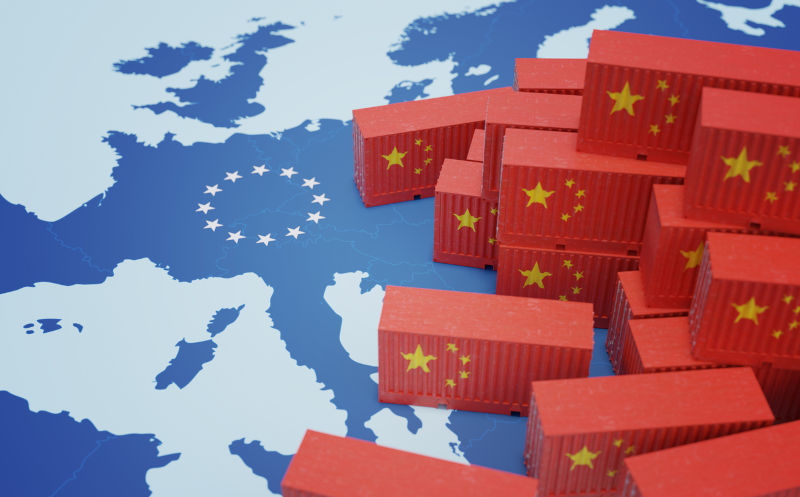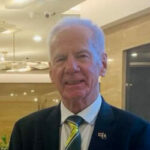In Asian media this week: Europe’s China business chief says conflict unavoidable. Plus: US lacks strategy for China confrontation; Japan’s new PM calls snap election; Junta’s election “census” a counter-insurgency ploy; America’s Gaza failure shakes confidence in rules-based order; Seoul has no answer for Pyongyang’s dirty campaign.
China and the EU are shaping up for a full-blown trade war, as Brussels dramatically increases tariffs on Chinese electric vehicles and Beijing retaliates with new charges on brandy imports.
Hong Kong’s South China Morning Post quoted the EU’s China-business chief as saying a trade war looked inevitable if present trends – a decline in China’s imports from Europe and an accelerating increase in Chinese exports – did not change.
Jens Eskelund, chairman of the EU Chamber of Commerce in China, said China was not the victim in the dispute.
Beijing had accused Brussels of naked protectionism but Eskelund said China should take the EU’s concerns seriously. Over the first seven months of this year, Chinese exports to Europe had soared while imports from the EU had crashed.
Global Times, an official newspaper, reported that the EU had voted to impose new tariffs on imports of Chinese battery electric vehicles of 35.3 per cent – on top of an existing 10 per cent tariff.
Ten countries (including France and Italy) supported the increase, five (including Germany and Hungary) were opposed and 12 abstained.
The division within the EU reflected concerns that protectionism could harm related sectors in the bloc, impacting technological innovation, the green transition and consumer interests, the paper said.
The initial Chinese retaliation was directed at France. SCMP reported, in a separate story, high-end brands Martell, Remy Martin and Hennessy, would have to pay anti-dumping “security charges” of at least 30 per cent on their exports to China.
The EU said it would mount a WTO challenge to the new duties.
China said it was investigating EU pork and dairy products. It also said it was considering raising tariffs on large, petrol-powered vehicles.
The Diplomat, an Asian online newsmagazine, said in a commentary the high number of abstentions in the EU’s electric vehicle vote reflected long-standing qualms about how Europe should stand up to China.
It said China’s threatened duties on large, petrol-powered vehicles would hit luxury brands, such as Mercedes, BMW and Porsche.
Mahbubani suggests wiser China approach for US
Under Joe Biden as president, Washington has tried to stabilise, at least a little, the relationship between the US and China. But the contest, the campaign against China, continues even though the US, has no clear, comprehensive strategy.
“A strategy is intended to achieve certain goals,” says Kishore Mahbubani, the elder statesman of Asian diplomacy. “It is not clear what the goals of the Biden administration are – what would constitute a victory for the United States over China?
“That has never been spelled out. That leaves everyone somewhat confused.”
Mahbubani, twice Singapore’s permanent representative to the United Nations and a former president of the UN Security Council, gave a long Q&A interview to Hong Kong’s South China Morning Post.
Does the US want to overthrow the Chinese Communist Party? he asks. That can only be done by the Chinese people.
Does it want to stop China’s economic growth? Again, that would depend on the people and the Chinese leadership.
Does the US want to isolate China, as it did with the Soviet Union? That could not be done, because China has more substantive ties with more countries than the US does.
“I’m going to recommend a wiser approach by the US,” Mahbubani says. “Even if the US is going to compete with China in some areas, it should also spell out the areas in which it can co-operate with China, not for the benefit of the Chinese people but for the benefit of the American people…
“[T]he Biden administration says fighting climate change should be a priority. I completely agree. But if fighting climate change is a priority, then we should press the pause button on the US-China geopolitical contest and focus on fighting climate change first.
“That would be an example of clear strategic thinking.
“The US needs to decide what is really important for its long-term interests, what it wants to accomplish and then work out ways and means of achieving these goals.”
Party withdraws backing for slush-fund MPs
Japan will go to the polls on October 27.
New Prime Minister Shigeru Ishiba dissolved the Lower House this week – just eight days after taking over as PM from Fumio Kishida.
The Asahi Shimbun newspaper said the 26-day gap between his inauguration and the election would be the shortest in the post-war period.
“The election will give voters a chance to voice their opinions about the funding scandal in the ruling Liberal Democratic Party, the new Ishiba administration and the policies of opposition parties,” the paper said.
In the last election, in October 2021, the LDP and its coalition partner Komeito won more than 290 seats – a comfortable majority in the 465-seat Lower House.
Before calling the election, the LDP decided it would not endorse 12 party lawmakers who were implicated in the political slush fund scandal that sabotaged the Kishida government.
The Japan Times said the disendorsed candidates would be forced to campaign without support, including financial assistance, from the party.
All those lawmakers were members either of a faction previously led by the late Shinzo Abe or that of former LDP secretary-general Toshihiro Nikai. The paper said the Abe faction was at the centre of the scandal.
As PM, Ishiba presented a new face for the LDP, the paper said in an editorial. A considerable part of his appeal came from his opposition to prevailing currents with the LDP, guaranteeing he would have to battle elements of his own party.
“The internecine struggles will be put off until after the general election,” the editorial said. “After the ballot, though, he will be tested. It promises to be a rocky tenure at a time when Japan needs stability at the top levels of national leadership.”
Footnote: Ishiba’s proposal for an Asian NATO appears dead on arrival, The Japan Times said. The idea had faced an outpouring of criticism that it was unrealistic and unpalatable for Japan’s partners. The Jakarta Post published an editorial on the subject. The heading said: “No to Asia’s NATO.”
Myanmar military tries to flush out resistance fighters
The Myanmar junta is conducting a census, even though the country is plagued by civil war and resistance forces control much of its territory.
The census is being carried out by 42,000 supposed volunteers and supervisors. It is ostensibly being used to create a voter list for an election said to be scheduled for next year (even though census data should be anonymous).
Mary Callahan, an American academic who is an expert on Myanmar, says the census is not related to the election.
“Essentially, it is a counter-insurgency operation, aimed in part at terrorising the population but mostly at flushing out armed opposition fighters,” she says in an article published by Frontier Myanmar, a Burmese exile online magazine.
Strangers coming to people’s houses, carrying electronic devices and surrounded by security will be viewed as a threat, Callahan says.
Households with members who have joined the armed resistance are at great risk, as the census includes questions about absent individuals, their whereabouts and their reasons for leaving the home.
Last month the opposition National Unity Government called for a boycott of the census.
“Ordinary households are being put in an impossible position,” Callahan says. “Those who follow the NUG in boycotting the census or giving false information face possible jail time.
“But if they cooperate, their homes could be marked…making [them] a possible target for anti-junta groups.”
America suffering decline in reputation in Asia
A senior editor at one of Asia’s most important newspapers has penned a personal account of his loss of faith in the US-led rules-based international order, caused by America’s inability to rein in Israel as it reduces Gaza to rubble.
Bhavan Jaipragas, deputy opinion editor of Singapore’s The Straits Times, says he has long placed his faith in the American-led order.
“The West’s steadfast support for Ukraine, alongside aid to Taiwan and the Philippines in the face of Chinese aggression, underscores the enduring strength and relevance of this rules-based order,” he says in a long opinion piece.
“But over the past year, Washington’s willingness to let Israel wage its war in Gaza with impunity has rattled this confidence.”
Jaipragas says that after the heinous Hamas October 7 attack, Washington, as Israel’s main ally, was expected to act as a restraining force, supporting Israel’s right to self-defence while upholding international law, the principle of proportionality and humanitarian standards.
Instead, the opposite has unfolded. Global frustration with Israeli Prime Minister Benjamin Netanyahu runs high, with many viewing the Gaza war as serving his personal interests and appeasing his far-right political colleagues.
“Yet, it is the US that has arguably attracted even more scorn for its perceived inability or unwillingness to rein in its ally,” he says.
Among his millennial contemporaries in Singapore, a growing cynicism is unmistakable, he says.
Blue-chip surveys show an international decline in positive views of the US, including in such Asian countries as Singapore, India, Japan, Malaysia and Indonesia.
“The US should be deeply alarmed by this state of affairs,” Jaipragas says.
“Yet there appears to be a troubling lack of awareness about the scale of its reputational decline.”
NK hits South with ‘garbage-bomb’ campaign
Many of North Korea’s “provocations” against the South are dramatic gestures – missile and satellite launches, or rocket tests.
But a more mundane form of harassment is proving as perplexing as it is annoying.
Pyongyang is floating balloons filled with garbage over the border and the South Korean military has no idea what to do about them – apart from collecting the rubbish after they land.
North Korea has sent more than 6,000 trash-filled balloons over the border since May, including 120 this week. Most have landed in or near Seoul. They have disrupted 172 flights, The Korea Times reports.
They have also caused fires, as the balloons carry heat-generated timers used to separate the loads of rubbish.
Officials in Seoul, the paper says, are struggling to devise realistic counter-measures.
The military has warned that it will take decisive military action if the balloons continue to pose a serious threat to public safety.
They have not said what the action might be – apart from ruling out shooting down the balloons, as this might cause hazardous substances to spread more widely, presenting even greater risks to South Korean people.
“It’s difficult to provide details in advance,” a military spokesperson said.
David Armstrong is an Australian journalist and editor with decades of experience, including as editor-in-chief of The Australian, editor of The Bulletin and The Canberra Times and deputy editor the Daily Telegraph in Australia. He is also former editor and editor-in-chief of the South China Morning Post, former president of the Bangkok Post company, former chair of the Phnom Penh Post company and is current chair of ucanews.com.

